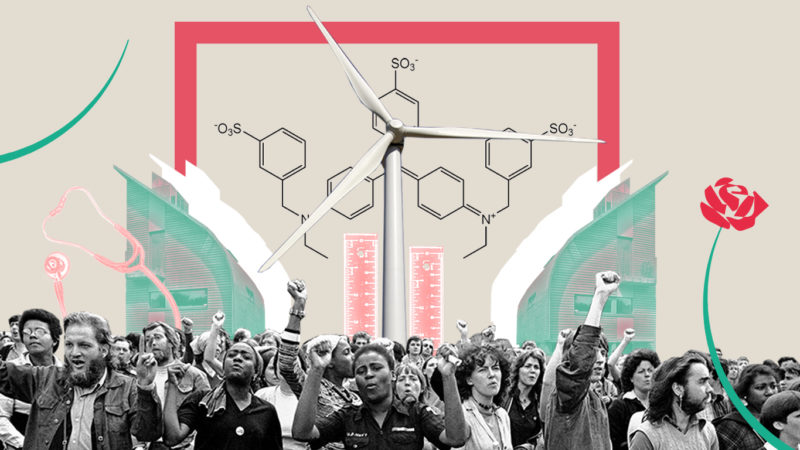
After the first wave, the next. Following the Tories’ deadly public health failures, leading to over 60,000 excess deaths, we face the next cruelties of their callous regime: from ruling class algorithms to an evictions crisis and the oncoming job loss tsunami. But there’s another crisis continuing unabated: climate catastrophe. The bad news has trickled in steadily: hottest day on record, hottest decade on record, Greenland ice melting beyond return. And confirmation of what we always knew: the impact of coronavirus on emissions reduction will be negligible.
It was encouraging, then, to see Ed Miliband launch a consultation in May on Labour’s plans for an ambitious green recovery, rightly comparing this to our 1945 moment. According to new figures revealed to Labour for a Green New Deal, just under 2,000 people submitted responses – and an incredible 1,400 of those endorsed our proposals for a socialist Green New Deal in a new post-Covid social settlement. Polling shows that the public are ready for it too: just 6% want the ‘back to normal’ Tory plan.
Change couldn’t be more urgent. Not a week goes by without thousands more redundancies. Labour is rightly standing with trade unions in demanding an extension to furlough – but we need proposals as well as critique.
That’s why our first demand for Labour’s green recovery plan has been for a million green jobs, as proposed by Labour’s 2019 manifesto and by the IPPR and the TUC. From powering up renewables to home insulation to care work, these plans can tackle unemployment while building a just and resilient economy that meets the needs of all. Building on Labour’s regional manifestos, they provide the key to reviving post-industrial parts of the country devastated by neoliberalism.
These jobs should be in the public sector. From aviation to energy, bosses have made workers pay the price for this pandemic. If we want secure, well-paid, unionised jobs and rapid decarbonisation, we need state intervention and job creation, not more bungs for business.
Take home insulation. Under the Tory proposals, it would take 80 years to retrofit the UK’s housing stock, and homeowners would benefit at the expense of renters. Labour’s 2019 ‘Warm Homes for All’ plan would do it by 2030, cutting household bills by £416, near-eradicating fuel poverty and cutting emissions by 10% in the process. Putting public health first means public ownership.
Alongside its welcome advocacy of nationalised rail, Labour should be demanding that vital services are brought back into public hands – like energy, where workers face terrible treatment, and water, which has enriched shareholders while polluting our rivers.
This is a vision of a society in which the inequality and precarity exposed by this pandemic are addressed through universal services. The coronavirus crisis has shown the vital importance of broadband for connecting people, and the inequalities of our privatised system – so let’s demand Labour’s policy of universal broadband. And now is the time for a transport revolution to prevent a car-driven recovery, and a National Care Service to fix our broken care system.
As Ed Miliband has made clear, we cannot afford to be timid. Standing up for workers must mean confronting the big polluters, from flying to fossil fuels. The coronavirus crisis has sent the aviation industry into freefall – and bosses have cut tens of thousands of jobs, while continuing to pay millions in dividends. It’s vital to stand with the trade union movement in resisting these attacks.
But we can’t rebuild a growing aviation sector. Instead, we need a people’s bailout, putting workers and the planet first. That means fighting for public equity stakes of struggling airlines, to wind down domestic flights, guarantee retraining and green jobs for all those cut loose by the aviation billionaires. Although a Labour spokesperson has said there is a “strong case” for taking public equity stakes in airlines, after we pushed the party on the issue, the Shadow Transport Secretary has not publicly backed the policy and has even welcomed aviation growth.
Shadow ministers have laudably advocated support for a just transition abroad – whether cancelling Global South debt or ending international fossil fuel subsidies. Now it must do the same at home. Our campaign has provided a vision for Labour to seize this moment and force the government into yet more U-turns. But it’s more than a vision – it’s a mandate.
Last month, Labour’s leadership replaced party conference with a ‘Connected’ event emptied of any provision for democratic policy-making. But while conference might be cancelled, party democracy isn’t. The overwhelming majority of submissions to Labour’s green recovery plan from members – more than two in every three – supported our programme. The most recent LabourList readers’ survey found overwhelming support among members for rapid decarbonisation and a million green jobs. Our voice is loud and clear.
Failure to follow through on this plan, or any backtracking on the 2019 conference motion and manifesto, would be a democratic outrage. Running for leader, Keir Starmer promised to “give members the power to shape policy”, and “fight for a Green New Deal now, not in 2024”. The party has passed up this opportunity in recent months. When Labour’s recovery plan is published, it must be built on the radical vision demanded by members.




More from LabourList
‘Turning public services around: Haringey’s story of child protection’
‘Can Labour turn the green tide back to red?’
Tom Belger column: ‘Why is Labour making migrant exploitation easier?’